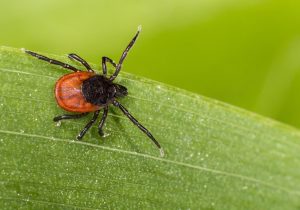
May is Lyme Disease Awareness Month
It may be called the great outdoors, but it can be far from great when it leads to a life-changing disease. What may start out as a weekend camping trip in the woods or a relaxing hike in the hills can quickly turn into a serious infection after a practically painless tick bite. The bite from these tiny ticks can take a bite out of your health and your life when the tick spreads a bacterial infection known as Lyme disease. May is recognized as Lyme Disease Awareness Month, and awareness is essential to protect yourself and your pets from this dangerous disease. Explore more about Lyme disease and ways to spread the word about this infection-spreading disease. Then, discover the risk factors, symptoms, and treatments available to understand what makes Lyme disease tick, so you can protect yourself and your health.
Take a bite out of Lyme disease
Lyme disease is an infection that is caused by the bacteria Borrelia burgdorferi which is transmitted to people and animals through the bite of a tiny, black-legged tick. It’s the most common tickborne disease in the United States, with around 476,000 new cases diagnosed every year, according to the Centers for Disease Control (CDC). While Lyme disease is a year-round and world-wide concern, there is an uptick in the number of ticks from the late spring through the early fall in the Northeast, Mid-Atlantic, upper Midwest, and northern Pacific parts of the United States. Ticks tend to live and thrive in grassy and wooded areas, such as forests, fields, woods, and leafy yards. Their presence in these places means that hiking, camping, gardening, and even walking in the park can raise your risk of ticks on your skin, your clothes, and your pets.
Explore your risk
While anyone who spends any time outside is potentially at risk for Lyme disease, certain places and pursuits can greatly increase your odds. The biggest factors affecting your risk are:
- Participating in outdoor activities like gardening, hiking, or walking in the woods, fields, parks, or lawns where ticks are found.
- Working outdoors in places that expose you to ticks.
- Owning pets that can carry ticks into your house.
A rash of symptoms
Lyme disease can produce a variety of symptoms and affects all parts of the body with certain symptoms appearing during different stages of the infection. While the signs may be slightly different for each person, the most common signs at each stage include:
Early symptoms:
- A red rash at the site of the bite that may resemble a bullseye or lesion that gradually expands over time
- Fever
- Chills
- Muscle aches
- Joint pain
- Headaches
Later symptoms, if left untreated:
- Rash spreading to other parts of the body
- Severe headaches
- Stiff neck
- Muscle weakness on the face
- Heart problems
- Arthritis
- Dizziness
- Numbness, tingling, or pain in the legs and feet
Ticking off your treatment options
As with all conditions, early diagnosis and treatment can make a difference. Since the symptoms can mimic other diseases and aren’t the same for every sufferer, Lyme disease can be difficult to diagnose. Consult your SignatureMD-affiliated doctor to help perform the required testing and recommend the right treatment for you. The course of treatment depends on your age, your health, your symptoms, your preferences, and how far the infection has progressed. Treatment in the earliest stages consists of oral antibiotics for two weeks. Later stages of Lyme disease often call for a combination of intravenous and oral antibiotics for up to one month.
Spread support for Lyme Disease Awareness Month
Lyme Disease Awareness Month comes along every May, which is the time when more people and more pets are exposed to leafy and wooded areas, and consequently, ticks. The month is an opportunity for sufferers, supporters, educators, and activists to share insights and information on preventing Lyme disease and other tickborne infections. Some ways to spread the word about stopping the spread of Lyme disease include starting a fundraiser, raising awareness on social media, asking elected officials to make public announcements, and taking part in community events. Any way that you can raise awareness, funds, or support for Lyme disease can help everyone fight the bite.
During Lyme Disease Awareness Month and beyond, spread the word about this dangerous infection to keep a tick from making others sick.